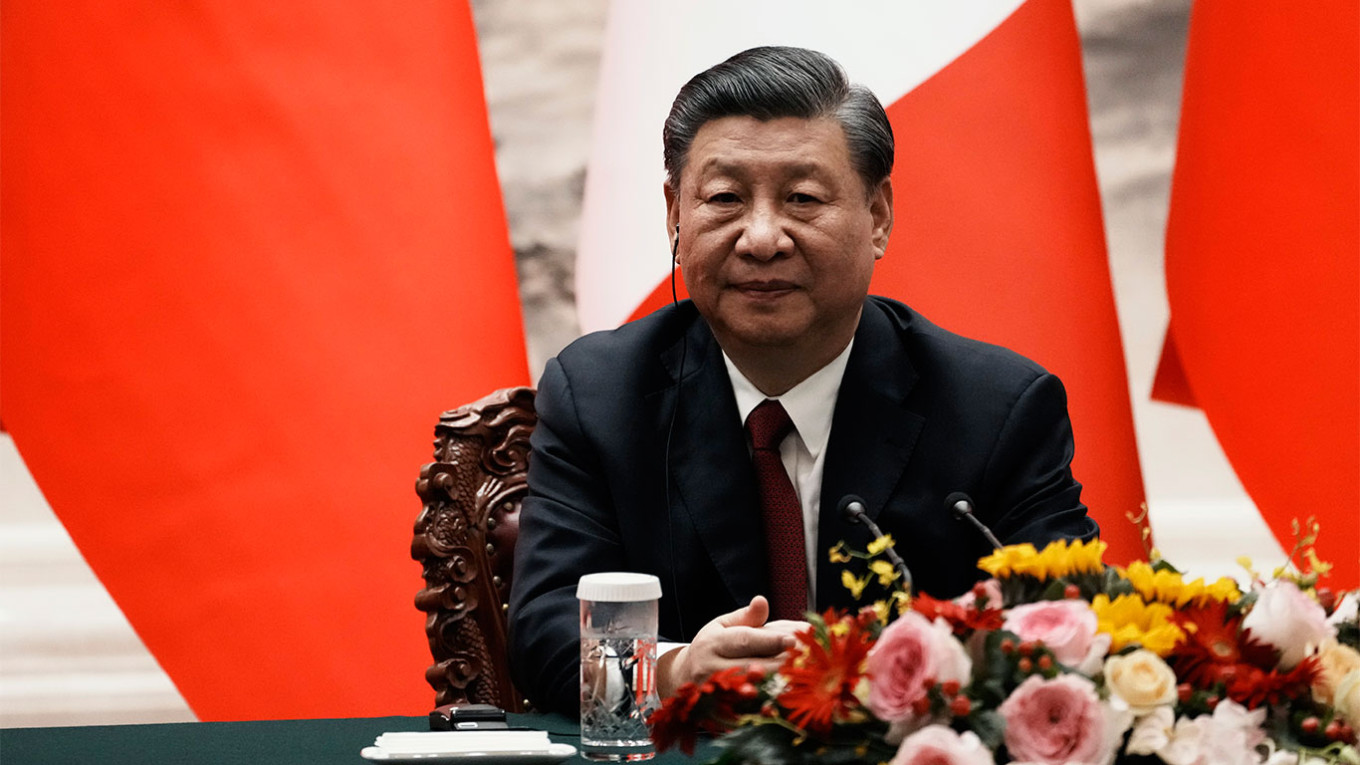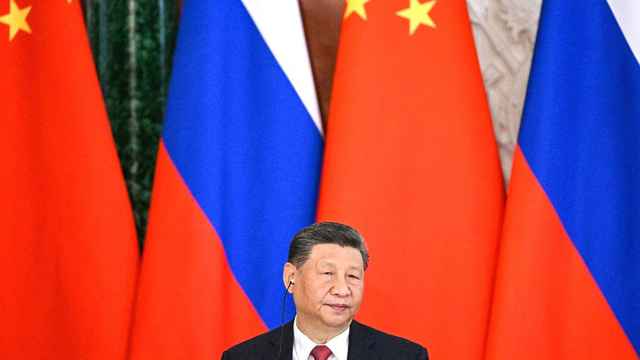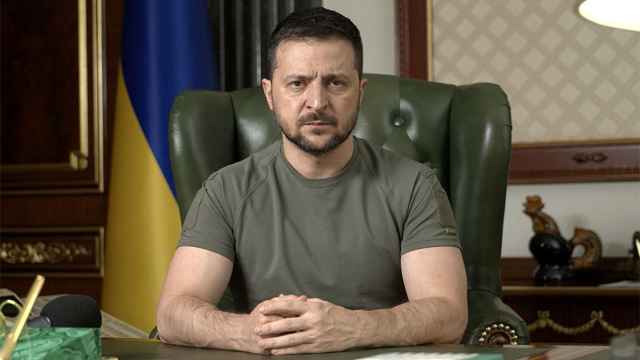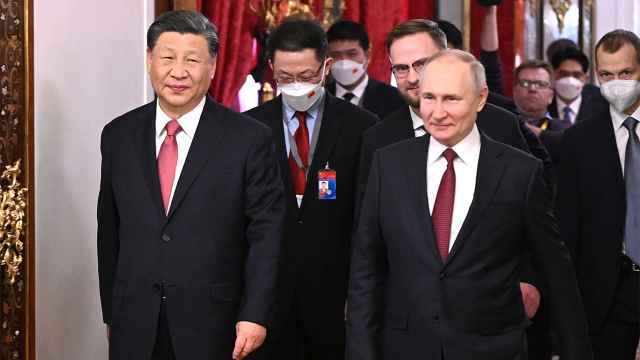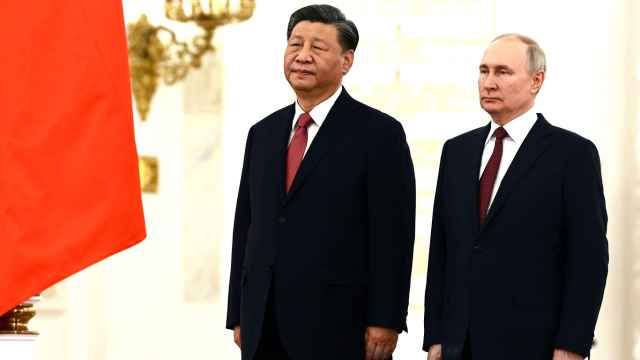Chinese President Xi Jinping spoke with his Ukrainian counterpart Volodymyr Zelensky by phone on Wednesday, the first known call between the two leaders since the start of Russia's invasion.
The nearly one-hour discussion, which reportedly included Xi advocating for peace negotiations, was met by Russian accusations that Ukraine was undermining efforts to end the fighting.
Beijing says it is neutral in the Ukraine conflict and Xi has never condemned the Russian invasion, but the Chinese leader has come under increased pressure from Western nations to step in and mediate.
A 12-point "position paper" published by China in February was seen by many Western governments as skewed towards Russia, and a friendly Moscow visit in March by Xi to meet Russian President Vladimir Putin led to widespread criticism.
"I had a long and meaningful phone call with President Xi Jinping," Zelensky said on Twitter.
"I believe that this call, as well as the appointment of Ukraine's ambassador to China, will give a powerful impetus to the development of our bilateral relations," he wrote.
Zelensky's spokesman Sergiy Nykyforov said on Facebook that the two leaders had "an almost one-hour-long telephone conversation."
Chinese state broadcaster CCTV reported that during the call — which was initiated by Kyiv — Xi told Zelensky that "talks and negotiation" were the "only way out" of the war.
"On the issue of the Ukraine crisis, China has always stood on the side of peace and its core position is to promote peace talks," CCTV reported Xi as saying.
According to a readout of the call, Xi said China "will neither watch the fire from the other side, nor add fuel to the fire, let alone take advantage of the crisis to profit."
"When dealing with the nuclear issue, all parties concerned should remain calm and restrained, truly focus on the future and destiny of themselves and all mankind, and jointly manage and control the crisis," Xi said.
China also said it would send a delegation and a "special representative" of its government to Ukraine with the aim of finding a "political settlement" to the conflict.
Open to talks
Zelensky has said repeatedly he would be open to talks with his Chinese counterpart, and Wednesday's telephone call "was initiated by the Ukrainian side," Yu Jun from China's foreign ministry told a press conference.
But in reaction to Wednesday's call, the Russian foreign ministry said, "the Ukrainian authorities and their Western minders have already shown their ability to mess up any peace initiatives."
Moscow noted "the readiness of the Chinese side to make efforts to establish a negotiation process."
France said it "encourages all dialogue" that can "contribute to a resolution of the conflict" that is "in line with the fundamental interests of Kyiv" and international law, said a French presidential official, asking not to be named.
February's 12-point paper called for a "political settlement" to the crisis and portrayed China as a neutral party, urging the two sides to enter into peace negotiations.
Its first point was that "the sovereignty, independence and territorial integrity of all countries must be effectively upheld."
But China has consistently refused to expand upon how that relates to the specifics of the Ukraine war, which was triggered when Moscow's forces invaded their neighbor.
In the paper, Beijing called on Russia and Ukraine to resume peace talks, stating that "dialogue and negotiation are the only viable solution."
"The international community should stay committed to the right approach of promoting talks for peace, help parties to the conflict open the door to a political settlement as soon as possible, and create conditions and platforms for the resumption of negotiation," the paper read.
The document was met with skepticism from Ukraine's allies, with NATO chief Jens Stoltenberg saying Beijing "doesn't have much credibility because they have not been able to condemn the illegal invasion of Ukraine."
Many at the time pointed to the fact that Xi had met with Putin but not even called Zelensky as evidence that China was not the impartial observer it claimed to be.
The Chinese leader's Moscow visit — during which Xi said ties with Russia were entering "a new era" — was viewed as a coup for Putin.
"I am sure that Russian-Chinese cooperation has truly unlimited possibilities and prospects," Putin said following the talks, where he toasted the "prosperity" of Russian and Chinese people and highlighted the "special nature" of the relationship between the two countries.
Putin called the talks with Xi "meaningful and frank" and said that Russia, which has been largely cut out of European markets because of sanctions, would be able to meet China's "growing demand" for energy.
A Message from The Moscow Times:
Dear readers,
We are facing unprecedented challenges. Russia's Prosecutor General's Office has designated The Moscow Times as an "undesirable" organization, criminalizing our work and putting our staff at risk of prosecution. This follows our earlier unjust labeling as a "foreign agent."
These actions are direct attempts to silence independent journalism in Russia. The authorities claim our work "discredits the decisions of the Russian leadership." We see things differently: we strive to provide accurate, unbiased reporting on Russia.
We, the journalists of The Moscow Times, refuse to be silenced. But to continue our work, we need your help.
Your support, no matter how small, makes a world of difference. If you can, please support us monthly starting from just $2. It's quick to set up, and every contribution makes a significant impact.
By supporting The Moscow Times, you're defending open, independent journalism in the face of repression. Thank you for standing with us.
Remind me later.


